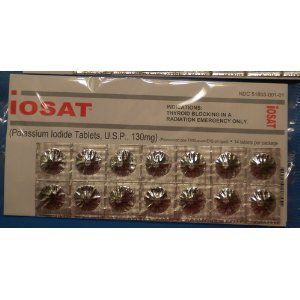...the fact that a large amt of young people now have thyroid nodules,an abnormality,is not a good thing...
It
sounds bad, of course, but is it worse than if the nuclear accident never happened? I want to say that it is, but does the data back that up?
From the same WHO report we're talking about:
The prevalence of thyroid nodules varies with the population studied and the methods of detection. Studies using ultrasound show a prevalence of 19–35%. Detected prevalence has increased in recent years, likely owing to improved resolution from advanced imaging technology.
If the "normal" percentage of nodules can be as high as 35%--and the prior research may not have been using a fine-toothed comb looking for nodules like they are in Fukushima--how does 42% compare with that? But like I said, there is no good comparison data for Fukushima yet so it's hard to say what "normal" is for the Japanese using the same medical definitions and the same quality of imaging technology until these new surveys are completed.
And besides ultrasound studies, autopsy studies have found thyroid nodules in 50-60% of people by the time they die. Most didn't even know that they had them.
I dont like it as I see it as spin being put on death numbers
Actually, the WHO is not saying anything about deaths, but of developing cancers. And thyroid cancers have a very high cure rate (not that that makes it any easier, for primarily children, to go through it). Will any more children actually die from thyroid cancer attributable to the nuclear disaster? None have so far and it's possible that none will die because thyroid cancer is highly treatable (not to say the treatment doesn't have a lasting impact, like no more thyroid gland).
A report like this is produced for the public health perspective, not the individual's health risk perspective. A significant increase in a rare condition is still a rare condition in the greater scheme of things which can easily be handled by the existing medical system. A small increase in a common condition results in many, many more people needing medical care for that condition which means mobilizing resources to accomodate that increase and that is actually a big deal from a planning perspective.
A 70% increase (even of a rare condition) makes good headlines. A 5% increase of a common condition is not such an interesting headline even though it means a lot more lives are being affected.
For comparison, I just saw this morning that about 75 Japanese have died so far this winter from falls related to clearing snow and ice from roofs. Compare 75 deaths vs 0 thyroid cancer deaths in Fukushima. Which issue is the bigger problem for Japan? (I know, a rather insulting question but I'm just making a point about the numbers involved in some sort of context.)
I'm not trying to sound like an apologist, I'm really not. I've been following the Fukushima situation regularly since the disaster and I think the nuclear meltdown is a tragedy that is still punishing folks to this day in many ways. I just wish the data so far was more clear cut about the damage it has caused.
**************************************************
On a different note, your comment about 70% got me to thinking about another situation. Many of us are enthralled with pharmaceuticals due to advertising about relative changes in risk. You may be dutifully chugging a pill everyday that gives you side effects like impotence because it "slashes" the risk of something undesirable by 50%.
But if a doctor said to you, would you trade impotence for reducing your lifetime risk of X from 2 in 100,000 to 1 in 100,000, would you still want to take that drug? Or, in a more public health way of looking at it, does it make sense to have 100,000 people take some very expensive drug to prevent just one more case of X?
